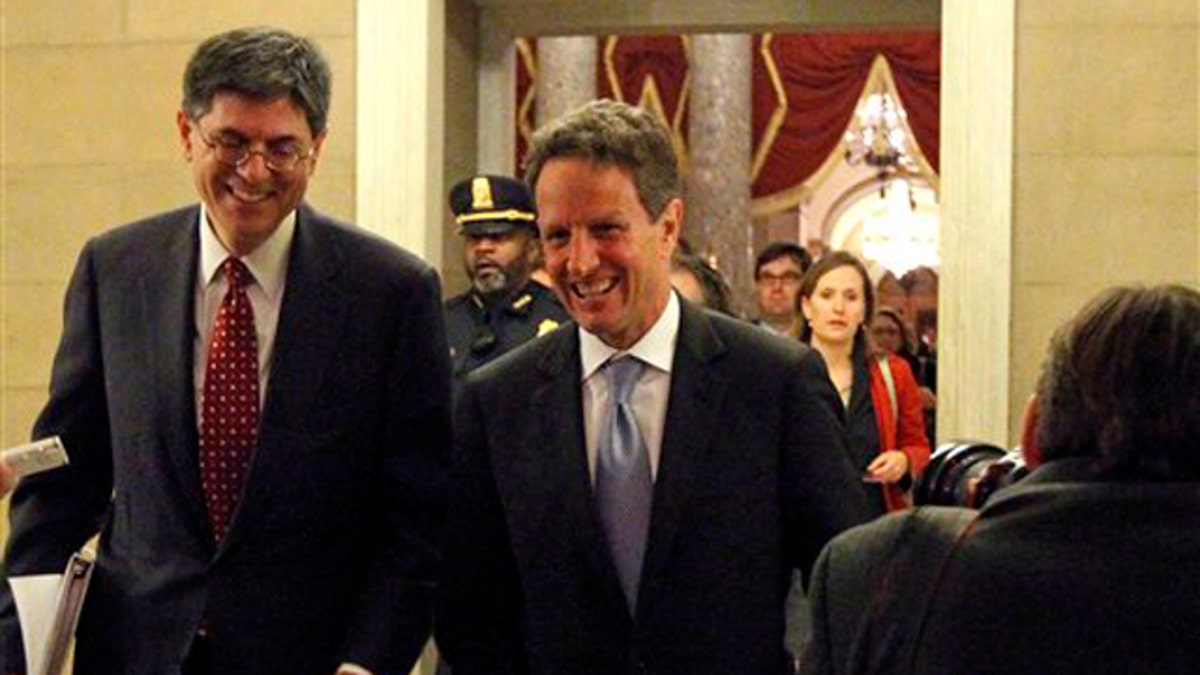
Treasury Secretary Timothy Geithner, center, with White House budget director Jacob Lew, arrive at the speaker's office for a meeting about tax cuts on Capitol Hill Dec. 1. (AP Photo)
The White House is pressing Republicans to extend all tax breaks in the expiring stimulus package, drastically broadening the tense debate on Capitol Hill over the Bush tax cuts.
The gambit by the Obama administration throws a curveball into the negotiations. While the lame-duck session has been consumed by proposals over how to avert the looming expiration of the Bush-era cuts, to this point, few have focused on the Dec. 31 expiration of a slew of tax provisions from President Obama's stimulus plan.
But senior administration officials said Thursday that those provisions are worth $150 billion a year -- and they want them extended temporarily. Treasury Secretary Tim Geithner and White House budget director Jacob Lew, the administration's representatives in the Bush tax cut talks, have delivered that message to the other negotiators, the officials said.
"If you believe it's harmful that taxes go up in a recession ... you certainly believe that's true for middle-class households," one official said.
Though the stimulus cuts haven't gotten much attention in Congress, the White House had previously pushed for some of the provisions to be extended.
The best-known of those is the Making Work Pay credit that gave up to $400 to individuals and up to $800 to families through adjusted withholding in their paychecks.
The law also included a change to the child tax credit. Under the old law, some low-income families got a refundable credit worth 15 percent of their income over $10,000. That threshold was changed slightly over the years but was lowered all the way down to $3,000 in the stimulus. The maximum credit is $1,000 per child.
It may sound like a technical change, but the Center on Budget and Policy Priorities estimates that low-income families with 7.6 million children would lose the credit entirely if the change is not extended.
There was also a change to the earned income tax credit, a provision for low-income workers. The stimulus increased the income cap after which the credit value starts to decline -- plus it added a category for families with three children.
The Bush tax cuts were the first to loosen the rules for the earned income and child tax credits. But the stimulus made them even more generous. Chuck Marr, director of federal tax policy with the Center on Budget and Policy Priorities, said it's vital to extend them. He said letting all these cuts expire would hurt the economy and make a big difference for low-income families.
"Now is the absolute worst time," he said.
Another tax break included in the stimulus bill is the American Opportunity Tax credit. That policy boosted from $1,800 to $2,500 the credit available to offset college expenses, in addition to expanding the range of eligible taxpayers. Other minor provisions range from tax breaks for businesses to a more generous benefit for commuters who use mass transit. The law raised from $120 to $230 the cap on monthly transit costs that would be considered tax-free.
Haven't heard of any of these? You're not alone. Nick Kasprak, an analyst with the Tax Foundation, said many taxpayers didn't even realize they were getting an income tax break from the stimulus.
"The stimulus tax cuts are not so much on people's radar. When people think of the stimulus bill, they think of all the spending provisions in it," he said.
House Republicans did not comment Thursday on whether the party would grant the renewed White House request to extend those breaks. Republicans are still pressing for an extension of all the Bush tax cuts and slammed the House Thursday for voting up an extension of middle-class tax cuts only.
Senior administration officials say they want a one-year extension on unemployment benefits, but they refused to put a timeframe on the other stimulus tax provisions they'd like to extend.
Administration officials said extending the tax breaks in the Recovery Act would pump eight times more money into the economy than the Republicans' push for upper-income tax breaks.
FoxNews.com's Judson Berger and Fox News' Wendell Goler and Kelly Chernenkoff contributed to this report.












































